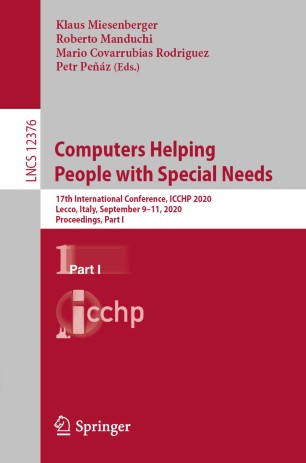

Most ebook files are in PDF format, so you can easily read them using various software such as Foxit Reader or directly on the Google Chrome browser.
Some ebook files are released by publishers in other formats such as .awz, .mobi, .epub, .fb2, etc. You may need to install specific software to read these formats on mobile/PC, such as Calibre.
Please read the tutorial at this link: https://ebookbell.com/faq
We offer FREE conversion to the popular formats you request; however, this may take some time. Therefore, right after payment, please email us, and we will try to provide the service as quickly as possible.
For some exceptional file formats or broken links (if any), please refrain from opening any disputes. Instead, email us first, and we will try to assist within a maximum of 6 hours.
EbookBell Team

4.8
64 reviewsThe two-volume set LNCS 12376 and 12377 constitutes the refereed proceedings of the 17th International Conference on Computers Helping People with Special Needs, ICCHP 2020, held in Lecco, Italy, in September 2020. The conference was held virtually due to the COVID-19 pandemic.
The 104 papers presented were carefully reviewed and selected from 206 submissions. Included also are 13 introductions. The papers are organized in the following topical sections:
Part I: user centred design and user participation in inclusive R&D; artificial intelligence, accessible and assistive technologies; XR accessibility – learning from the past, addressing real user needs and the technical architecture for inclusive immersive environments; serious and fun games; large-scale web accessibility observatories; accessible and inclusive digital publishing; AT and accessibility for blind and low vision users; Art Karshmer lectures in access to mathematics, science and engineering; tactile graphics and models for blind people and recognition of shapes by touch; and environmental sensing technologies for visual impairment
Part II: accessibility of non-verbal communication: making spatial information accessible to people with disabilities; cognitive disabilities and accessibility – pushing the boundaries of inclusion using digital technologies and accessible eLearning environments; ICT to support inclusive education – universal learning design (ULD); hearing systems and accessories for people with hearing loss; mobile health and mobile rehabilitation for people with disabilities: current state, challenges and opportunities; innovation and implementation in the area of independent mobility through digital technologies; how to improve interaction with a text input system; human movement analysis for the design and evaluation of interactive systems and assistive devices; and service and care provision in assistive environments
10 chapters are available open access under a Creative Commons Attribution 4.0 International License via link.springer.com.